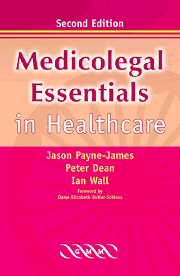Book contents
- Frontmatter
- Contents
- Contributors
- Editors' note for the first edition
- Editors' note for the second edition
- Foreword
- Table of statutes
- Table of cases
- 1 Legal institutions and the legal process
- 2 Human rights and healthcare professionals
- 3 Medical ethics and the forensic physician
- 4 Confidentiality
- 5 Consent to medical treatment
- 6 Professional bodies and discipline
- 7 Complaints in the National Health Service
- 8 The Mental Health Act (England and Wales)
- 9 Death certification and the role of the coroner
- 10 Tissues and organs
- 11 Organ donation
- 12 Living wills
- 13 Euthanasia and end-of-life decision-making
- 14 Abortion and reproductive health
- 15 The Children Act 1989
- 16 Clinical negligence
- 17 Legislation for medicines and product liability
- 18 Clinical trials: ethical, legal and practical considerations
- 19 Medicolegal implications of blood-borne viruses
- 20 Healthcare professionals in court – professional and expert witnesses
- Index
16 - Clinical negligence
Published online by Cambridge University Press: 12 January 2010
- Frontmatter
- Contents
- Contributors
- Editors' note for the first edition
- Editors' note for the second edition
- Foreword
- Table of statutes
- Table of cases
- 1 Legal institutions and the legal process
- 2 Human rights and healthcare professionals
- 3 Medical ethics and the forensic physician
- 4 Confidentiality
- 5 Consent to medical treatment
- 6 Professional bodies and discipline
- 7 Complaints in the National Health Service
- 8 The Mental Health Act (England and Wales)
- 9 Death certification and the role of the coroner
- 10 Tissues and organs
- 11 Organ donation
- 12 Living wills
- 13 Euthanasia and end-of-life decision-making
- 14 Abortion and reproductive health
- 15 The Children Act 1989
- 16 Clinical negligence
- 17 Legislation for medicines and product liability
- 18 Clinical trials: ethical, legal and practical considerations
- 19 Medicolegal implications of blood-borne viruses
- 20 Healthcare professionals in court – professional and expert witnesses
- Index
Summary
Encouraged by higher expectations of healthcare provision, patients are more prepared to question their treatment, to seek explanations of adverse events, and even to embark upon litigation.
Such litigation places tremendous financial strain upon the health service, as well as providing an undoubted source of stress for both clinicians and claimants alike.
An individual who has suffered personal injury as a result of a medical intervention will often wish to seek some form of redress, and currently the only means of obtaining financial compensation is by pursuing an action for clinical negligence through the civil courts.
CIVIL LAW AND NEGLIGENCE
‘Clinical negligence’ is any litigation involving negligence in the delivery of healthcare. The law of negligence is concerned with defining the formal legal relationships that exist between private persons, where one party (the ‘claimant’) alleges to have been harmed by the unreasonable actions of another (the ‘defendant’). The law relating to clinical negligence is a specialist area of the law of ‘negligence’ which itself is a branch of civil law called tort.
The principles of civil law require the claimant to discharge the burden of proving his case, by adducing sufficient factual evidence to persuade the court that it was more probable than not (i.e. greater than 50%) that the defendant's actions caused his injury.
- Type
- Chapter
- Information
- Medicolegal Essentials in Healthcare , pp. 167 - 178Publisher: Cambridge University PressPrint publication year: 2004

